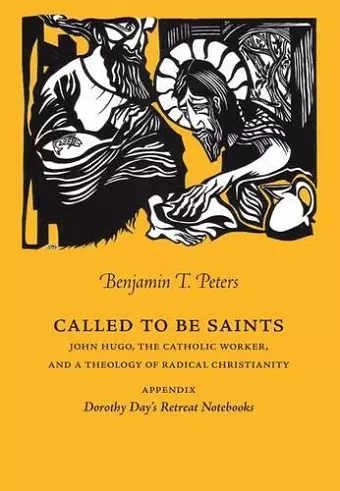Called to be Saints
John Hugo, The Catholic Worker, and a Theology of Radical Christianity
Dorothy Day author Benjamin T Peters author
Format:Hardback
Publisher:Marquette University Press
Published:30th Jun '16
Should be back in stock very soon

In his address to Congress in September 2015, Pope Francis surprised many when he included Dorothy Day and Thomas Merton along with Abraham Lincoln and Martin Luther King, Jr, as examples of four “great Americans” he wished to extol. While perhaps better known than Merton, adding Day to the pantheon of great figures in American history was certainly significant. Indeed, since her death in 1980, there has been a steadily growing recognition of the importance of Dorothy Day along with a steadily growing body of scholarship on her. All of which has only been bolstered by the renewed move to have Day canonized. Unfortunately, absent from all this study and promotion of Day and her causes has been much attention on Fr. John Hugo and “the retreat” that exerted such a profound effect on her in the 1940s, bringing about her “second conversion.” There are very real reasons why these important theological sources have been overlooked or even ignored, reasons largely rooted in the context of early twentieth-century American Catholicism. Called to be Saints offers a theological and historical analysis of the role that Hugo and the retreat play in understanding Day and the radical Christianity she put forth—a notion of the Christian life that remains relevant today.
1. In this incisive study of John Hugo and the Catholic Worker retreat, Peters puts contemporary public theologians on notice. “Jansenism” and “sectarian irresponsibility” fail to pass historical-theological muster as designations for either Hugo or Dorothy Day. In comparing Hugo’s recovery of the early modern Jesuit sources for the retreat to European ressourcement, Peters underscores Hugo’s contemporary significance as well as the deep connections among theologies of nature and grace, holiness, and political commitments. An indispensable contribution to contemporary Catholic radicalist thought!William L. Portier, Mary Ann Spearin Chair of Catholic Theology, University of Dayton2. Peters' book is so much more than a fresh look at a controversial figure who influenced Dorothy Day; it is a brilliant diagnosis of what ails American Catholic social ethics even today. By connecting Hugo not just to Day but to de Lubac and Blondel, Peters challenges a dominant strand of ""public theology"" that assumes the sufficiency of nature and the irrelevancy of the supernatural to public life. This book is well-researched, well-written, and wholly absorbing, and I hope it restarts some serious arguments.William T. Cavanaugh, DePaul University 3. Peters’ painstaking research will give readers a new understanding of the theological support Fr. John Hugo provided to Dorothy Day as she both suffered ostracism and deepened her spirituality in the World War II era. By contextualizing the controversy surrounding Fr. Hugo’s retreats and unmasking the notion of the two-tiered Church then prevalent, Peters shows the true radicalism of Dorothy Day’s message. Rosalie G. Riegle, author of Voices from the Catholic Worker and Dorothy Day: Portraits by Those Who Knew Her.
ISBN: 9781626007086
Dimensions: unknown
Weight: 960g
586 pages